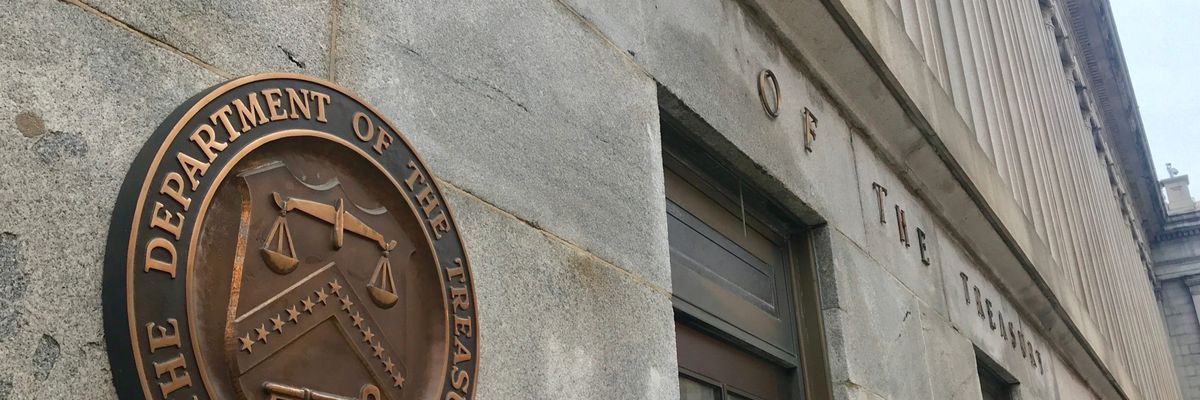The Trump administration calls its policy towards Iran one of “maximum pressure.” By its latest move, it would more properly be called “siege and starve,” as the feigned interest in establishing leverage for comprehensive negotiations with Iran has been replaced by a full-throttle push to pulverize Iran’s economy and collapse its social and economic life.
The Trump administration has now designated Iran’s entire financial sector under Executive Order (“E.O.”) 13902, subjecting all Iranian financial institutions — formal or otherwise — to an effective international boycott. Even with the crushing sanctions thus far visited on Iran, this move will have devastating impact, severing the limited ties that connect the Iranian people to the outside world and that allow them to sustain some modicum of economic life. Disconnected from the global financial system, unable to conduct the most basic of cross-border financial transactions, and denied their limited currency reserves abroad, Iran’s economy will be forced into the dark, surviving, if at all, on a subterranean diet of barter and shell companies.
The humanitarian impact could well be significant. The Iranian people deserve more than the most basic of medicines and foodstuffs, but even those will be made difficult to come by as a result of this policy. Even as the Trump administration claims that it will preserve existing humanitarian exceptions, banks that remain linked to Iran’s economy will sever those relationships, unsure of what the future holds, unclear about the financial benefits of maintaining trade with Iran, and fearful of being sanctioned for dealing with Iran’s banks in any capacity, humanitarian or otherwise.
Those who practice U.S. sanctions have long been cognizant of the peculiar challenges conducting trade in humanitarian goods with Iran, which existed even when significant parts of Iran’s economy remained open for business. Those challenges will now not just be exacerbated but will erect a prohibitive bar. No one, in good-faith, could advise that trade in humanitarian goods with Iran is without sanctions risk.
Some, like those at the Foundation for Defense of Democracies — the brain trust for the Trump administration’s Iran policy and a group whose views generally align with Israel’s Likud Party — will dispute all this, claiming that the new policy leaves open clear channels for humanitarian trade with Iran. No one need take this argument seriously. Those behind this move have long sought to crush Iran’s economy — and, by implication, its people — including through explicit targeting of Iran’s access to humanitarian goods. That explains the sanctioning of Iran’s central bank and FDD’s latest push to add another layer of sanctions and designate all of the non-designated Iranian banks. Their objective is clear: crush the people to stir political change. In some contexts, we use a word for this tactic: terrorism.
Based on reports, the Trump administration’s new policy came after visits from the Israeli government and FDD’s lobbying efforts. This is par for the course: FDD has long laundered Israeli talking points and intelligence before the U.S. government to make it seem as if there is a natural constituency for the policy being advocated. But there is no sizable constituency, at least not an American one. That is why the policy is being trotted out quietly in the midst of a thunderous presidential election season: to hide from the American people how their government is maliciously targeting Iranians and setting the stage for one last-ditch effort at war. Advocates of this policy know that there will be no referendum on it and that — subsumed by President Trump’s total saturation of the news market — the U.S. public will have little chance to even learn of it.
One can only hope the nightmare is a short-lived one for Iranians. In less than a month, the United States will conduct presidential elections, and there is by now clear indication that former Vice President Joe Biden is the strong front-runner. The Biden campaign has intimated its desire to return to the Iran nuclear deal and to lift U.S. sanctions in return for Iran re-establishing nuclear restrictions. That could herald a quick return to the status quo that existed at the end of the Obama administration, in which Iran was slowly re-integrating itself into the global economy while the United States was secure in the knowledge that Iran’s nuclear program was under wraps.
But a return to the nuclear deal will not address the pathologies that underlie the Trump administration’s “siege and starve” policy towards Iran nor will it compensate what has become a “lost generation” in Iran, struggling under the boot of American economic domination. Washington’s policy community will be quick to forgive those who advocated for this outrage, incorporating them back into the fold and treating them as honest interlocutors for a particular policy persuasion. The Iranian perspective will continue to be ignored, shut out from consideration through the potent combination of an embargo that prohibits meaningful dialogue between Americans and Iranians and an attitude of disregard for how our adversaries see things. In this manner, the wheel is reinvented and lessons go unlearned.
But if the United States seeks a sensible policy towards Iran — one that neither avoids the uncomfortable truths about the Islamic Republic nor seeks to destroy the country or risk war at every turn — there will need to be due consideration for how the U.S. has come to this policy, exacting an economic siege without historical precedent in the modern world and degrading what remains of its tattered moral standing in turn.
















